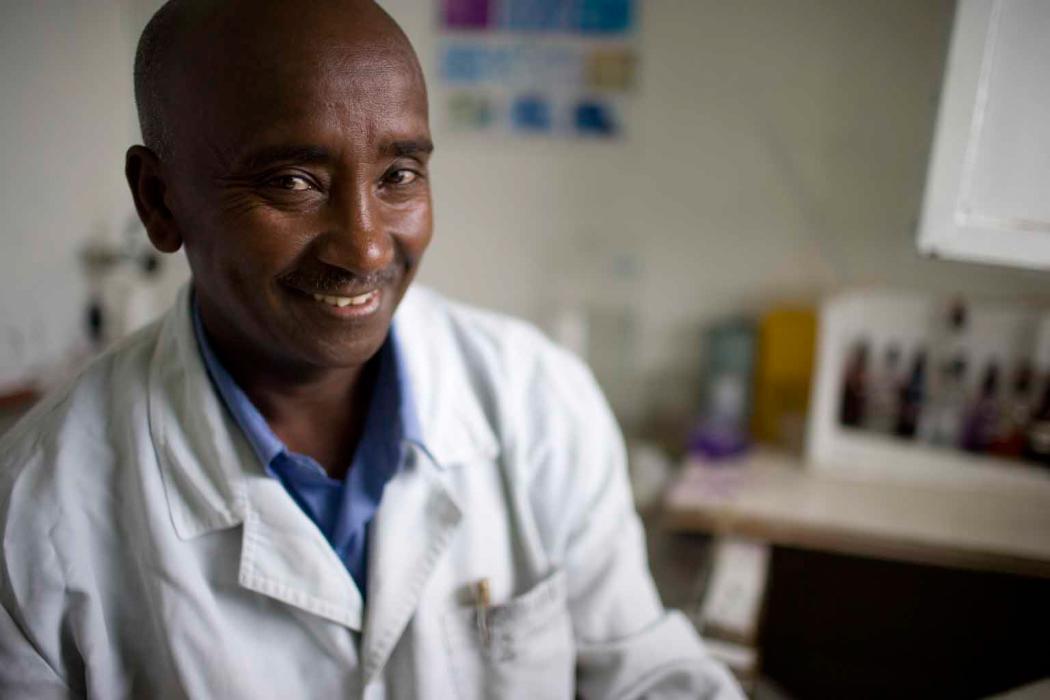How We Partnered with Ethiopia to Create the Nation's First-Ever Domestic IPC Budget

A health worker in Ethiopia. Photo by Charles Harris for IntraHealth International.
Strong infection prevention and control (IPC) programs are essential for #SafeSupportedHealthWorkers.
Strong infection prevention and control (IPC) programs are a cornerstone of health care delivery and essential for keeping frontline health workers, patients, and communities safe. Avoidable infections are just that—avoidable—when countries put robust IPC measures in place. That’s why the World Health Organization recommends that every country has its own national IPC program that is, ideally, funded by the government.
Domestic funding empowers nations to have full ownership of their IPC program, and ultimately leads to better outcomes for health workers.
External funding from partners and donors is a start, but domestic funding empowers nations to have full ownership of their IPC program, offers more sustainable financing at a time when external funding is becoming increasingly unpredictable, and ultimately leads to better outcomes for frontline health workers and their patients. My organization, Resolve to Save Lives, partners with country stakeholders to advocate for domestic IPC budgets, and recently celebrated a victory with our colleagues in Ethiopia, which last year announced its first-ever national IPC budget.
Ethiopia has made strides by taking seriously the need for domestic IPC funding. These initial funds are modest, totaling some 3.2 million Birr (about $58,000) over the course of a year, and much of Ethiopia’s IPC funding still comes from external sources. But establishing a brand-new program budget is no small feat and demonstrates how political will can be deployed for progress. Ethiopia is already planning to use these funds to support dissemination of IPC guidelines and standard operating procedures to the subnational level, which is where we’ll continue this important advocacy work.
Establishing a brand-new program budget is no small feat.
Arriving at a budget line was not an overnight victory. Over two years, we worked closely with our partners in the Ministry of Health to support their calls for dedicated domestic funds. That meant facilitating connection of our Ministry of Health partners with the Ministry of Finance—which has ultimate authority to create new budget lines—and making sure each understood the other’s priorities and constraints. Above all, our partners had to make a strong case for a domestic IPC budget at strategic points throughout the annual budget cycle.
The moral case for IPC speaks for itself—and so do the economics. For instance, every dollar invested in hand hygiene saves $16 in future health costs. Our team created policy briefs including this, and other relevant information about safe cleaning and decontamination, handling and disposal of waste, and personal protective equipment to equip busy stakeholders with the information they needed to make an informed decision about investing domestic resources. We also discussed the necessity for domestic funding to improve Ethiopia’s scores in the Joint External Evaluation, a vital WHO-led assessment that quantifies a country’s ability to deal with public health threats.
I hesitate to say we were fortunate this work took place during the emergency phase of the COVID-19 pandemic, but I would say this timing worked to our advantage. Witnessing the global catastrophe of frontline health workers getting infected and dying from avoidable infections meant that ministers heard the call loud and clear. In the wake of the pandemic, there is now an opportunity for national decision-makers to prioritize establishing the national IPC programs that should, frankly, already be in place.
There’s work to be done to translate decisions in capital cities into improvements for frontline health workers.
National-level work is important, but there’s work to be done to translate decisions in capital cities like Addis Ababa into genuine improvements for rural areas and, ultimately, improvements for frontline health workers. If we want to extend vital protections to every single frontline health worker—providing them the equipment and skills needed to stay safe while protecting the rest of us—this work must be followed by an ongoing commitment. Not just in crises like COVID-19, but through the ongoing outbreaks that are, sadly, an ongoing reality for frontline workers.
After two years of advocacy, I want to again congratulate our partners in Ethiopia on this landmark achievement. And what better time to celebrate than World Health Worker Week, a movement to influence policymakers to translate policies and promises into long-term investments in the health workforce. This investment is a much-needed step toward making sure every frontline health worker is kept safe and supported in their work. At Resolve to Save Lives, we know that strategic investment from national decision-makers in IPC programs is an essential component of that. And we’ll continue working with our Ethiopian and other worldwide partners to fight for that investment. We hope this win will inspire other country leaders and partners to push for concrete investments to support and protect frontline health workers.
